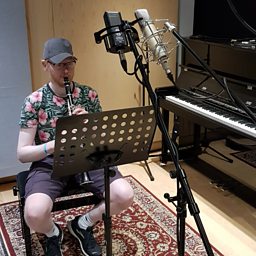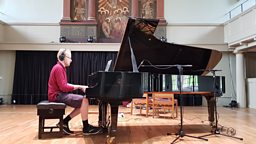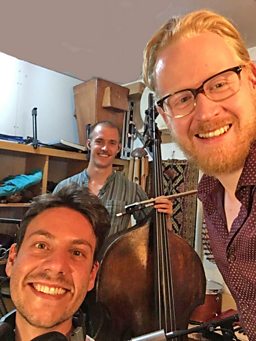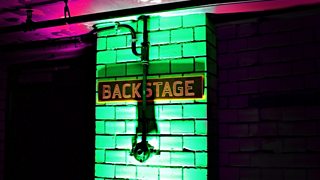Making the music for Beethoven Can Hear You
Beethoven Can Hear You composer Lloyd Coleman writes as a musician with lived experience of hearing loss.
It’s impossible to ignore the towering, intimidating genius of Ludwig van Beethoven. When we consider that even today there remains a certain stigma attached to deaf musicians – despite the huge advancements in technology and more enlightened attitudes towards disability Beethoven could only have dreamed of in 19th century Vienna – I think it’s beyond remarkable that he was able to overcome the psychological trauma deafness caused him. He battled on through his affliction to write many of his most cherished masterpieces that continue to resonate with millions the world over, two centuries later.
I’ve lived with moderately severe bilateral hearing loss almost all of my life, and during my own childhood I quickly became used to wearing hearing aids, reading lip patterns, going to speech therapy sessions after school and learning to channel out unwanted background noises.
Most important of all though, was the unfailing love and support from my family, friends, music teachers and mentors, who never once blinked as I pursued my dream of a career in music.
It therefore seems obvious to me that Beethoven’s adversity was very much tougher than anything I’ve faced in my career. Beethoven was already established as one of the most famous and celebrated musicians of his day when his secret battle with hearing loss began and threatened to shatter his identity as a composer.
Coincidentally, Beethoven was around the same age as I am now, 28, when he first noticed an early warning sign of things to come – a whining, painfully high-pitched tone in his inner ear, but regardless completed one of my favourite Beethoven works, his astonishing Eroica Symphony, within a few years of this.
From the moment I read Timothy X Atack’s script for Beethoven Can Hear You, I loved its dual sense of playful originality and heart-breaking poignancy and didn’t need asking twice by director James Robinson to jump on board to compose the score. The perfect casting of Peter Capaldi and Sophie Stone made the project more irresistible still, and even early drafts of the script were peppered with many helpful suggestions for the moods required from the music beneath the dialogue.

Born in South Wales, Lloyd Coleman is a composer, clarinettist and broadcaster. He won a place at Chetham’s School of Music in Manchester and became a member of the National Youth Orchestra of Great Britain, before moving to London to study at the Royal Academy of Music.
Nowadays, he combines his composing activities with a busy performing schedule – most often with conductor Charles Hazlewood and the Paraorchestra, the first professional ensemble in the world comprised of disabled musicians. Recent career highlights include three appearances at Glastonbury Festival, a critically-acclaimed performance of kraftwerk re:werk at WOMAD Festival (co-composed with Charlotte Harding) and a UK orchestral tour with award-winning folk group The Unthanks.
When not making music himself, Lloyd enjoys sharing his passion for it with audiences on TV and radio, including the Βι¶ΉΤΌΕΔ Proms.

I agreed to take on this project in late February, when the world was a very different place indeed. We had planned to record in the Βι¶ΉΤΌΕΔ’s Hoddinott Hall in Cardiff with a small group of players, but it soon became apparent we weren’t going to be able to record musicians together safely in this way.
My brilliant sound engineer Marco Rinaldi and I hatched a plan to record each musician separately in their own homes over the course of a week, often taking over their spare rooms with a temporary jungle of microphones, cables and laptops.
In fact, the only instrument to be recorded in a more conventional space was the piano, which I played at the beautiful St George’s Bristol, my local concert venue.

I’m grateful to fellow musicians Tom Aldren (violin), George White (viola), Tom Wraith (cello) and Martin Ludenbach (bass) for lending their extraordinary talents to the project, and to Marco for mixing it with such sensitivity and care under very unusual circumstances.
And when listeners hear the music combined with Catherine Robinson’s overall sound design, I hope you will enjoy immersing yourself in it as much as we enjoyed creating it.
-
![]()
Drama on 3: Beethoven Can Hear You
An immersive exploration of Beethoven and his music from writer Timothy X Atack (Forest 404); starring Peter Capaldi and Sophie Stone, with an original score by composer Lloyd Coleman.

